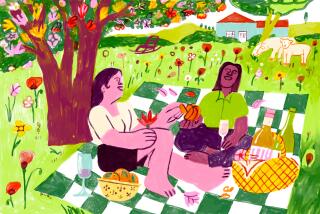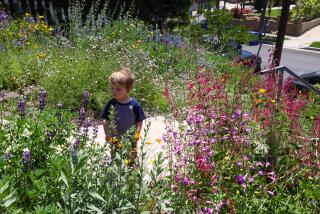Lovely Spring After Drought Is Poetic Justice
- Share via
It has inspired the most lyrical poetry ever written--and the worst.
Yes, indeed, spring has sprung.
Or, as 16th-Century English poet Thomas Nashe put it, with a bit more panache: “Spring, the sweet spring, is the year’s pleasant king . . . .”
After six long years of drought followed by a deluge in January and February, spring has arrived in Southern California in a way that few people can remember.
Back-yard gardens are filled with blossoms. Lawns that once looked like something from the lunar landscape are green again. The disgrace of trying to drive in wet weather is just a foggy memory.
From the once-parched slopes of the Tehachapis to Skid Row, from the greening Santa Monica Mountains to the lawns of Northridge, it surely is “springtime, the only pretty ring time.” Credit Shakespeare for that one.
“This is absolutely the most wonderful spring we’ve had in years,” said Shirley Kerins, curator of the herb garden at Huntington Library, Art Collections and Botanical Gardens in San Marino. “Everything is just bursting . . . the weeds as well.”
Kerins said that even at the lush Huntington Gardens, the drought hurt many plants and trees. The long rains, however, revived the greenery with a deep watering.
Steve Burback, a meteorologist for WeatherData Inc., which provides forecasts for The Times, said that the last trace of rain to fall on Los Angeles came March 28--just 0.27 of an inch.
The rainy season usually ends in late April, he said. But given the weather patterns, he expects little more rain to fall, certainly no big storms.
But biologists say it’s still too early to tell if the wildflowers will put out as dazzling a display in northern Los Angeles County as they did last year after the so-called “March miracle” rains.
The hills south of Gorman are singed with sporadic patches of blazing California poppies, blue bonnets and yellow daisies. A wintry 60 degrees and windy on Saturday, it’s E.E. Cummings country: “Just-spring when the world is mud-luscious.”
Lawyer Pam Marx of Eagle Rock was among those who trekked up from the city Saturday with children in tow in hopes of finding a carpet of color in the hills. They found pretty carpet, though it wasn’t exactly wall to wall.
“What we’ve found is we’ve had to work a little bit harder this year, but we’ve come across things we wouldn’t have otherwise discovered,” said Marx, pointing out pieces of dried mud crisscrossed with raccoon and bird tracks.
Even in the inner-city, the season has its charms.
After enduring two months of the heaviest rainfall in two decades, while hunkered under a cardboard box, Herman Barron, a five-year veteran of Skid Row, sauntered down 2nd Street recently, counting his few blessings.
On his back was a tattered jacket. On his feet, a pair of Reeboks with no shoelaces. All his meager possessions were gathered in three plastic bags.
But all around him was sunshine . . . glorious sunshine.
“This was a rough winter, the worst. I got soaked many times,” he said. “Now it’s wonderful. It’s a blessing, this sunshine.”
Reclining in the shade of an avocado tree recently, Johnnie Alonzo and a small group of friends at the Century Freeway Garden near 118th Street braced themselves for a hectic day of watching the cabbage grow.
For nearly 20 years, the neatly hoed gardens have been a rural haven in the midst of Watts. For the gardeners, planting in the spring is a ritual that they look forward to. No rain on your head, no hot sun beating down on you. Just pleasant weather. You hoe a little, rest a little.
Alonzo, a retired construction worker, said he had to plant his carrots, beets and beans a bit late this year because of the rains.
They’ve been coming up like gangbusters anyway. “It’s going to be a great garden year,” he said.
Even such urban farming has proved inspirational. Charles Dudley Warner, a 19th-Century writer, waxed poetic on the vagaries of planting in the city: “The thing generally raised on city land is taxes.”
More to Read
Sign up for The Wild
We’ll help you find the best places to hike, bike and run, as well as the perfect silent spots for meditation and yoga.
You may occasionally receive promotional content from the Los Angeles Times.







